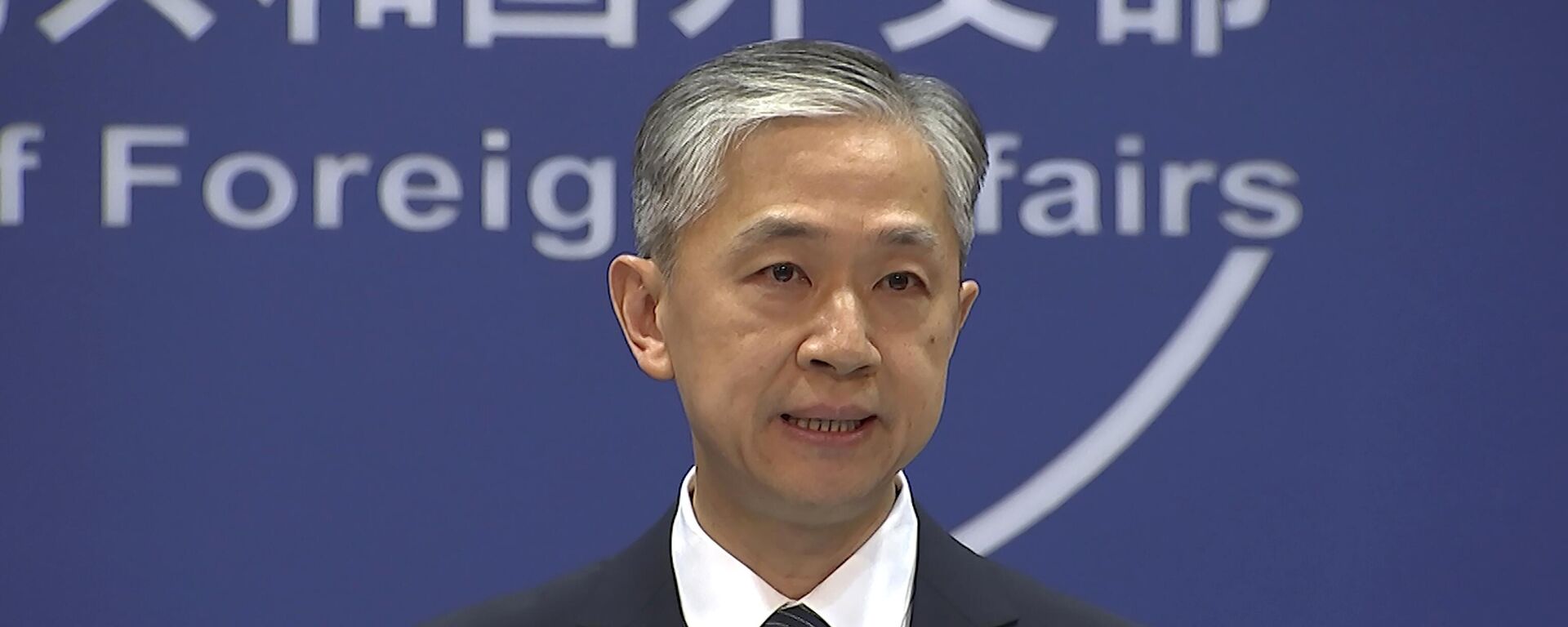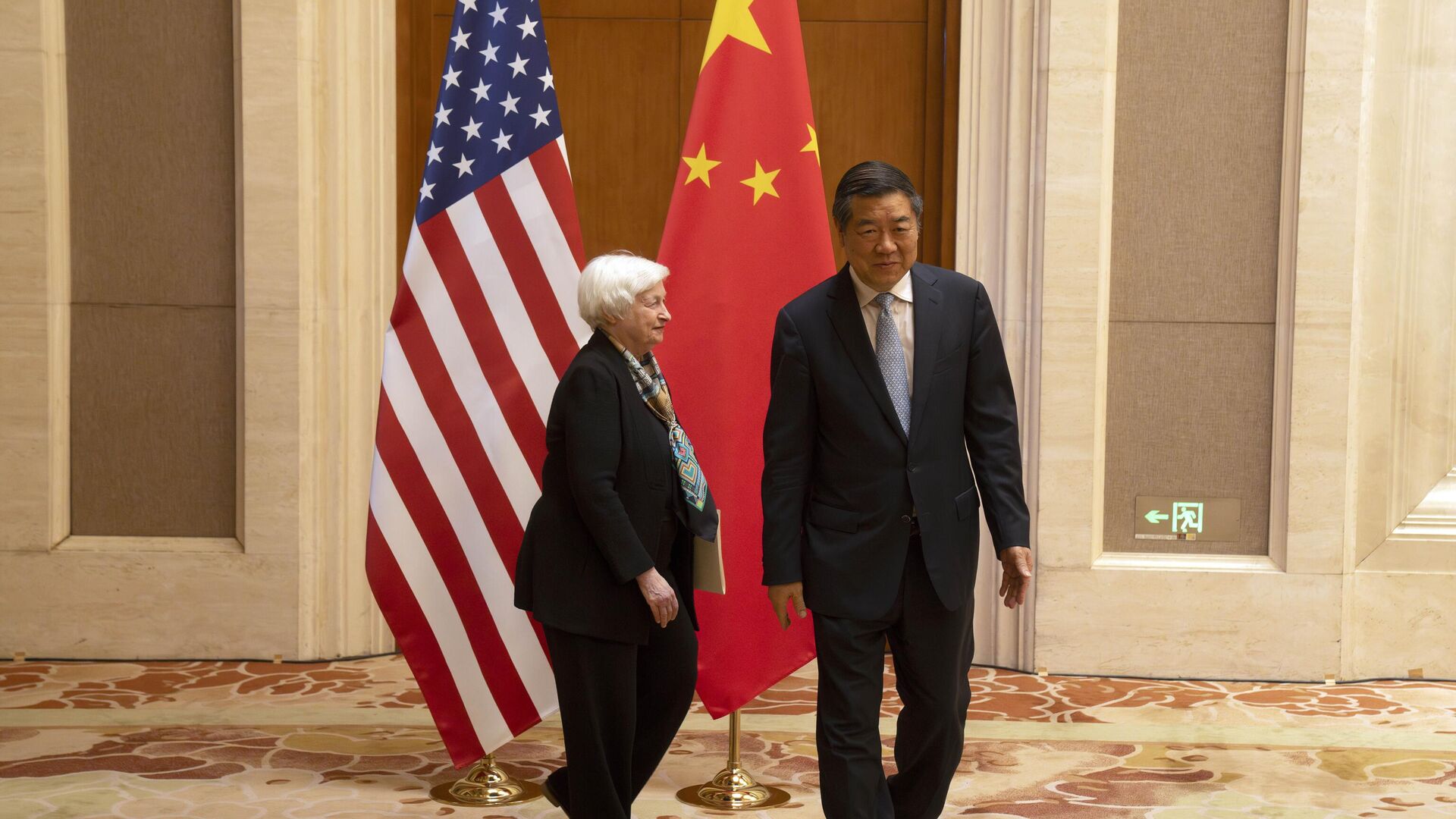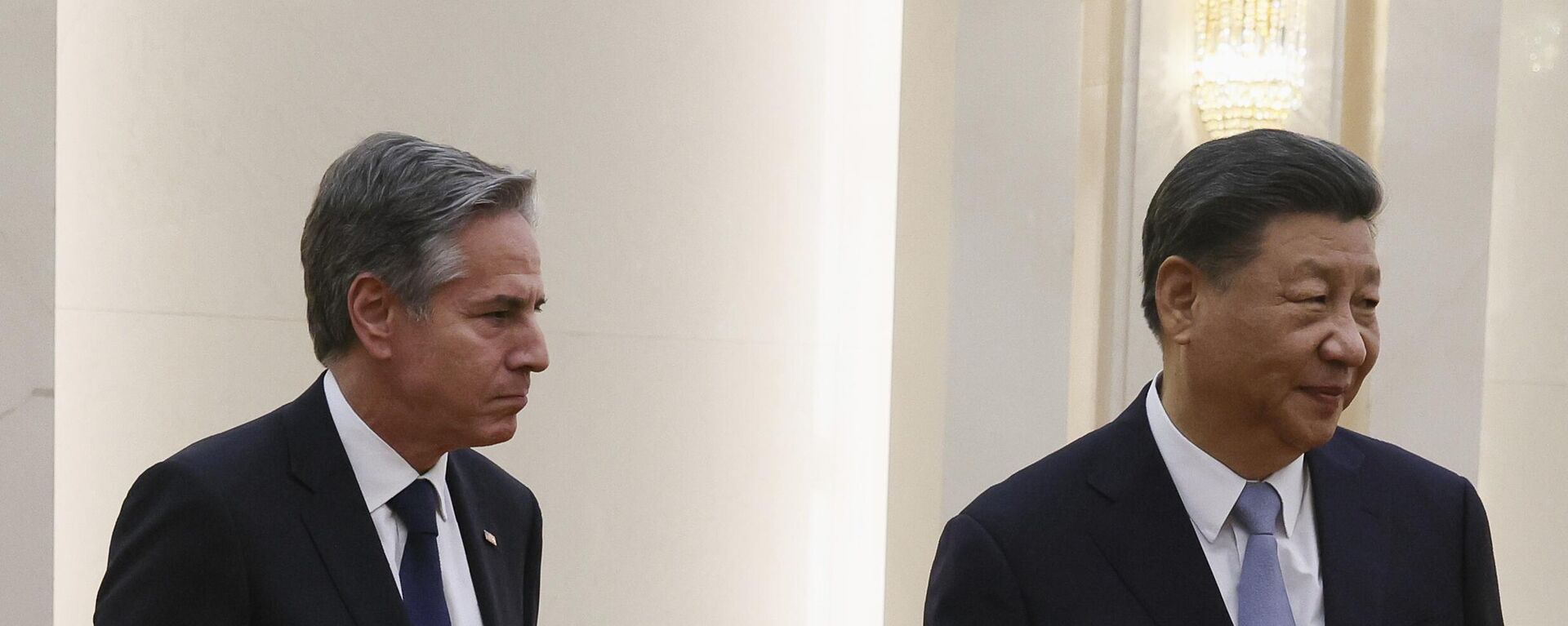https://sputnikglobe.com/20231106/yellen-us-can-compete--work-with-china-ahead-of-meeting-with-beijings-economic-chief-1114771160.html
Yellen Argues US Can Compete & Work With China Ahead of Meeting With Beijing’s Economic Chief
Yellen Argues US Can Compete & Work With China Ahead of Meeting With Beijing’s Economic Chief
Sputnik International
Chinese Vice Premier He Lifeng is set for another round of talks with US Treasury Secretary Janet Yellen as the two economic and nuclear superpowers seek to manage their fraught relationship.
2023-11-06T19:32+0000
2023-11-06T19:32+0000
2023-11-06T20:26+0000
world
janet yellen
he lifeng
us-china relations
trade talks
competition
https://cdn1.img.sputnikglobe.com/img/07e7/07/08/1111756050_0:0:3072:1728_1920x0_80_0_0_62e4b861a61b4c8cafb7465945824caf.jpg
The two previously met in Beijing in July, where they emphasized the need to continue the rapprochement reached by the US and Chinese leaders at the Group of 20 summit in Bali last year, including maintaining and expanding communication and cooperation on a variety of global issues. Part of the November 9-10 meetings in California will aim at convening the new economic and financial forums launched last month between the US Treasury and China’s finance ministry and central bank.Ahead of the meeting, Yellen on Monday penned an op-ed in US media in which she argued “economics is not a zero-sum game, and we seek healthy economic competition with China that can benefit both countries over time.”However, she also argued “healthy competition requires a rules-based, level playing field” and faulted Beijing for “unfair economic practices” that had allegedly fouled that scenario.Yellen’s position is an extension of that articulated by US President Joe Biden at the Bali summit in November 2022, when he told Chinese President Xi Jinping that the US intended to continue competing with China, but did not want a “Cold War” type of scenario that precluded cooperation where it was possible.On Monday, Chinese media reported He had been appointed to head of the office of the Central Financial Commission (CFC), China’s financial regulator, as well as the Communist Party’s lead at the Central Financial Work Commission (CFWC), part of an effort to strengthen the party’s ideological and political influence over the financial system.As a country continuing to emerge from a century’s worth of domination by Japan and European imperial powers, China began in the mid-late 20th century to experiment with different forms of state-directed or state-managed capitalism to complement the planned socialist system put in place after communist victory in 1949. So-called “Socialism with Chinese Characteristics,” adopted in the 1980s, has proven to be a recipe for lasting success, allowing the country to rapidly industrialize while ensuring the Communist Party continues to direct the overall socioeconomic trajectory toward construction of a modern socialist society - which the party says it aims to complete by the centennial of the revolution in 2049.In August 2022, US-China relations reached a nadir after then-US House Speaker Nancy Pelosi, at the time the third-most powerful person in the US government, ignored Chinese warnings and traveled to Taiwan, where she denounced Beijing and hailed Taipei’s defiance. Massive Chinese war games near Taiwan followed, and the Biden-Xi meeting in Bali that November was aimed at repairing some of that diplomatic damage.
https://sputnikglobe.com/20231106/china-us-to-discuss-implementation-of-international-arms-control-treaties---beijing-1114756317.html
https://sputnikglobe.com/20230619/limited-progress-from-xi-blinken-talks-but-core-us-china-issues-likely-beyond-compromise-1111300783.html
Sputnik International
feedback@sputniknews.com
+74956456601
MIA „Rossiya Segodnya“
2023
News
en_EN
Sputnik International
feedback@sputniknews.com
+74956456601
MIA „Rossiya Segodnya“
Sputnik International
feedback@sputniknews.com
+74956456601
MIA „Rossiya Segodnya“
janet yellen; he lifeng; treasury; china competition; sanctions
janet yellen; he lifeng; treasury; china competition; sanctions
Yellen Argues US Can Compete & Work With China Ahead of Meeting With Beijing’s Economic Chief
19:32 GMT 06.11.2023 (Updated: 20:26 GMT 06.11.2023) Chinese Vice Premier He Lifeng is set to travel to San Francisco in the United States later this week for another round of talks with US Treasury Secretary Janet Yellen as the two economic and nuclear superpowers seek to manage their relationship, which has been fraught with conflict in recent years.
The two
previously met in Beijing in July, where they emphasized the need to continue the rapprochement reached by the US and Chinese leaders at the
Group of 20 summit in Bali last year, including maintaining and expanding communication and cooperation on a variety of global issues. Part of the November 9-10 meetings in California will aim at convening the new economic and financial forums launched last month between the US Treasury and China’s finance ministry and central bank.
A senior US Treasury official who spoke with Chinese media suggested it was unlikely there would be specific “deliverables” after the meeting, saying it was not a “policy trade” situation “where we trade one thing for another.”
Ahead of the meeting, Yellen on Monday
penned an op-ed in US media in which she argued “economics is not a zero-sum game, and we seek healthy economic competition with China that can benefit both countries over time.”
“As a foundation, our two nations have an obligation to establish resilient lines of open communication and to prevent our disagreements from spiraling into conflict,” Yellen wrote. “But we also know that our relationship cannot be circumscribed to crisis management. Together, the United States and China represent 40% of the global economy. A constructive economic relationship can not only serve as a stabilizing force for the overall relationship but also benefit workers and families in both countries and beyond.”
However, she also argued “healthy competition requires a rules-based, level playing field” and faulted Beijing for “unfair economic practices” that had allegedly fouled that scenario.

6 November 2023, 08:57 GMT
Yellen’s position is an extension of that articulated by US President Joe Biden at the Bali summit in November 2022, when he told Chinese President Xi Jinping that the US intended to continue competing with China, but did not want a “Cold War” type of scenario that precluded cooperation where it was possible.
Their meeting comes ahead of another summit of the ministers and leaders of the Asia-Pacific Economic Cooperation countries hosted by Biden. According to media reports, Biden plans to meet with Xi at the summit.
On Monday, Chinese media reported He had been appointed to head of the office of the Central Financial Commission (CFC), China’s financial regulator, as well as the Communist Party’s lead at the Central Financial Work Commission (CFWC), part of an effort to strengthen the party’s ideological and political influence over the financial system.
As a country continuing to emerge from a century’s worth of domination by Japan and European imperial powers, China began in the mid-late 20th century to experiment with different forms of state-directed or state-managed capitalism to complement the planned socialist system put in place after communist victory in 1949.
So-called “Socialism with Chinese Characteristics,” adopted in the 1980s, has proven to be a recipe for lasting success, allowing the country to rapidly industrialize while ensuring the Communist Party continues to direct the overall socioeconomic trajectory toward construction of a modern socialist society - which the party
says it aims to complete by the centennial of the revolution in 2049.
However, since 2017, the US has regarded this trajectory as part of an attempt by Beijing and Moscow to overturn the “rules-based international order” and Washington has reoriented its global strategy toward what it calls “great power competition” with Russia and China.
That has included not just economic sanctions on both nations aimed at crippling leading parts of their economy, but also a vast expansion of military assets and provocations near both nations, including funneling more weapons to Taiwan, a Chinese province governing separately from Beijing.
In August 2022, US-China relations reached a nadir after then-US House Speaker Nancy Pelosi, at the time the third-most powerful person in the US government, ignored Chinese warnings and
traveled to Taiwan, where she denounced Beijing and hailed Taipei’s defiance. Massive Chinese war games near Taiwan followed, and the Biden-Xi meeting in Bali that November was
aimed at repairing some of that diplomatic damage.




